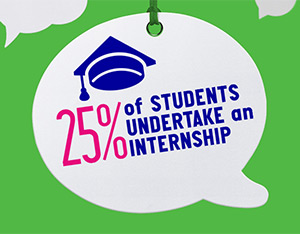As you eye up the workforce you’ve been longing to join, the thought of how to stand out from the hundreds of other graduates is now a rather important consideration.
A recent survey of more than 800 18 to 24 year olds found that the greatest hurdle for graduates trying to secure their first role is employers want them to have relevant experience in their industry.
A recent survey of more than 800 18 to 24 year olds found that the greatest hurdle for graduates trying to secure their first role is employers want them to have relevant experience in their industry.
The SEEK survey also showed that a mere 25% of students had sought an internship or work experience within their chosen field on their own accord. That’s a big gap between what employers want and graduates that match their criteria.
Its common sense that faced with a stack of CVs from candidates with equally good qualifications and personal attributes, employers will look more favourably on those who have gained industry experience while studying. Not only does it suggest the candidate will have a basic understanding of the working environment and entry level tasks, but it shows initiative and a willing to get ahead of the pack.
Faced with this knowledge, it’s never too early to gain relevant industry experience. A foot in the door can be a step away.
Landing your first opportunity.
To begin, make a list of all the local companies that are relevant to your industry that you would like to work for. Then, think about whom you already know who may be able to assist; relatives or family friends working in your desired industry could point you in the right direction, provide contacts or offer you a placement themselves.
Campus-hosted industry events can also be a great way to meet people working in the industry you aim to join. But be sure to put your best foot forward, you could find yourself across a table from any one of these people in a job interview in the future. It’s hard, but plucking up the courage and taking the initiative to introduce yourself and initiate conversation sends a strong and important message to prospective employers.
If all else fails, let your fingers do the walking and start emailing the relevant contacts at those companies you would like to work in. Be sure to spell check everything – your cover letter and your CV – before sending it off, first impressions last. And don’t be afraid to follow up with your top picks if you don’t hear anything within a week.
On the job.
You may not be getting paid for the work you’re doing right now but behave on the job as if you are gunning for a pay rise. After all, this could be the ticket to your first career pay check.
Be open to all the experiences and opportunities that come your way during an internship, and be willing to get stuck in, regardless of how menial a task may seem. Remember that these are the basics you are mastering, all before your first full time role. This will become your competitive advantage, so make that advantage count.
(Job) Hunting season.
With a degree in hand, and an updated CV dispatched to the relevant job ads, the true benefits of work experience will begin to pay off. The mere fact that you have been inside your chosen career environment and spent time working on even the most junior of tasks can set you head and shoulders above your competition.
Not only does it speak volumes in terms of motivation and drive, but industry experience will often be the first discussion point in an interview. Prospective employers will be keen to hear of the work you completed and your perceptions of the industry and your experience will allow you to talk with more authority on the subjects.
Whether a work experience opportunity leads directly to a permanent placement, or puts you ahead of the candidate pack, the benefits of this kind of experience cannot be denied.
Make sure you check out these other graduate articles:



